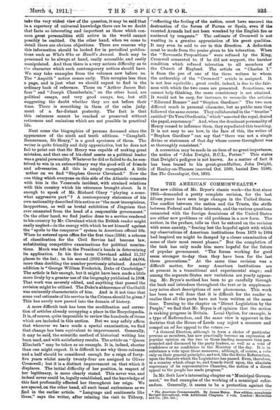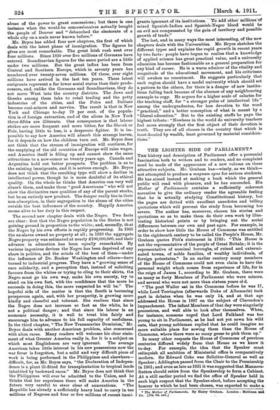THE AMERICAN COMMONWEALTH.*
THE new edition of Mr. Bryce's classic work—the first since 1895—demanded a pretty complete revision, for the last
fifteen years have seen large changes in the United States. The conflict between the nation and the Trusts, the strife between Federal and State interests, and the various questions connected with the foreign dominions of the United States are either new problems or old problems in a new form. The author, in the preface, tells us that he entered on the revision with some anxiety, "fearing lest the hopeful spirit with which my observations of American institutions from 1870 to 1894 had inspired me might be damped by a closer examination of some of their most recent phases." But the completion of the task has only made him more hopeful for the future of popular government. "The forces working for good seem stronger to-day than they have been for the last three generations." At the same time revision was a difficult matter, for many American institutions are at present in a transitional and experimental stage ; and among the separate States new variations are yearly appear- ing. Mr. Bryce's method has been to go carefully through the book and introduce throughout the text or in supplemen- tary notes short descriptions of new phenomena. This work has been so well done that it is difficult for the reader to realise that all the parts have not been written at the same time. Turning to the chapter on "Direct Legislation by the People," we find that Mr. Bryce is of opinion that the notion is making progress in Britain. Local Option, for example, is a type of Referendum, and the same view is apparent in the doctrine that the House of Lords may reject a measure and
compel an ad hoc appeal to the voters "A General Election, although in form a choice of particular persons as members, has now practically become an expression of popular opinion on the two or three leading measures then pro.. pounded and discussed by the party leaders, as well as a vote of confidence or no confidence in the Ministry of the day. It is in substance a vote upon those measures ; although, of course, a vote only on their general principles, and not, like the Swiss Referendum, upon the Statute which the Legislature has passed. Even, therefore, in a country which clings to, and founds itself upon, the absolute supremacy of its representative Chamber, the notion of a direct appeal to the people has made progress."
In Mr. Seth Low's interesting chapter on "Municipal Govern- ment," we find examples of the working of a municipal refer- endum. Generally, it seems to be a protection against the • The American Commonwealth. By James Bryce. New edition, completely Revised throughout, with Additional Chapters. 2 vols. London : Macmillan and Co. [21s. net.]
abuse of the power to grant concessions ; but there is one instance when the would-be concessionaires actually bought the .people of Denver and "debauched the electorate of a whole city on a scale never known before."
. Mr. Bryce has added four new chapters, the first of which deals with the latest phase of immigration. The figures he gives are most remarkable. The great Irish rush sent over four millions. Since 1820 over five millions of Germans have entered. Scandinavian figures for the same period are a little under two millions. But the great influx has been from Central and Southern Europe, which in seventy years has numbered over twenty-seven millions. Of these, over eight millions have arrived in the last ten years. These latest emigrants represent a far lower social status than their prede- cessors, and, unlike the Germans and Scandinavians, they do not move West into the country districts. The Jews and Greeks among them take to retail trading and the petty industries of the cities, and the Poles and Italians become coal-miners and navvies. The result is that in New York and Chicago to-day 79 per cent. of the popula- tion is of foreign extraction, and of the aliens in New York three-fifths are illiterate. One consequence is that labour strikes are more frequent and more bitter, for the Slovak or Pole, having little to lose, is a desperate fighter. It is im- possible to say how America will absorb this strange leaven, for it depends on how the children turn out. Mr. Bryce does not think that the stream of immigration will continue, for the emptying of the old countries of Europe will raise wages, and America itself is filling up and cannot show the same attractions to a new-comer as twenty years ago. Canada and Argentina hold out better prospects. The problem is as to the existing immigrants, and it is serious enough. Mr. Bryce does not think that the resulting type will show a decline in intellectual power, though he is more doubtful of its ethical quality. On the whole he thinks that America can very well absorb them, and make them "good Americans" who will not show the distinctive race qualities of any of the parent stocks, but be an entirely new product. The danger really lies in their non-absorption, in their segregation in the slums of the cities outside the best influences of the country. Happily America seems alive to her duty in this respect.
The second new chapter deals with the Negro. Two facts are clear : first that the Negro population in the States is not gaining ground in proportion to the white; and, secondly, that the Negro by his own efforts is rapidly progressing. In 1865 the ex-slaves owned no property at all ; in 1910 the aggregate Negro property was estimated at nearly 2100,000,000, and their advance in education has been equally remarkable. By various ingenious devices the Negro has been deprived of any share in politics, and the minds of the best of them—under the influence of Dr. Booker Washington and others—have turned to industrial progress. They have a "growing sense of race solidarity, and a perception that, instead of soliciting
favours from the whites or trying to cling to their skirts, the Negro must go his own way, make his own society, try to
stand on his own feet, with the confidence that the more he succeeds in doing this, the more respected he will be." The hopeful side of the matter is that the South is becoming prosperous again, and, with her prosperity, is growing more kindly and cheerful and tolerant. She realises that since the Negro does not increase so fast as the white, he is not a political danger; and that since his labour is an economic necessity, it is well to treat him fairly and encourage him to advance to his full capacity of usefulness.
In the third chapter, "The New Tranamarine Dominion," Mr.
Bryce deals with another American problem, also concerned with alien races. Many readers will welcome his clear state- ment of what Greater America really is, for it is a subject on which most Englishmen are very ignorant. The average American takes little interest in his new possessions now the war fever is forgotten, but a solid and very difficult piece of work is being performed in the Philippines and elsewhere— difficult, for, as Mr. Bryce says, "the Declaration of Indepen- dence is a plant ill-fitted for transplantation to tropical lands inhabited by backward races." Mr. Bryce does not think that the Philippines will ever be admitted to the Union, and he thinks that her experience there will make America in the future very careful to steer clear of annexations. "The Republic has already a sufficiently heavy load to carry in ten millions of Negroes and four or five millions of recent immi-
grants ignorant of its institutions. --To- add other millions-Of mixed Spanish-Indian and Spanish-Negro blood would be an evil not compensated by the gain of territory and possible growth of trade."
The last, and in many ways the most interesting, of the new chapters deals with the Universities. Mr. Bryce sketches the different types and explains the rapid growth in recent years by two facts : people have begun to realise that a knowledge of applied science has great practical value, and a university education has become fashionable as a general preparation for any kind of career. He is a warm admirer of the vitality and magnitude of the educational movement, and his criticisms will awaken no resentment. He suggests particularly that each region should have a model university which should set a pattern to the others, for there is a danger of new institu- tions falling back because of the absence of any neighbouring example to copy. He argues for a higher scale of salaries for the teaching staff, for "a stronger pulse of intellectual life" among the undergraduates, for less devotion to the word "practical," and a better conception of what is meant by a "liberal education." But to the existing staffs he pays the highest tribute : "Nowhere in the world do university teachers feel more strongly that the first object of their devotion is truth. They are of all classes in the country that which is least dazzled by wealth, least governed by material considera- tions."











































 Previous page
Previous page